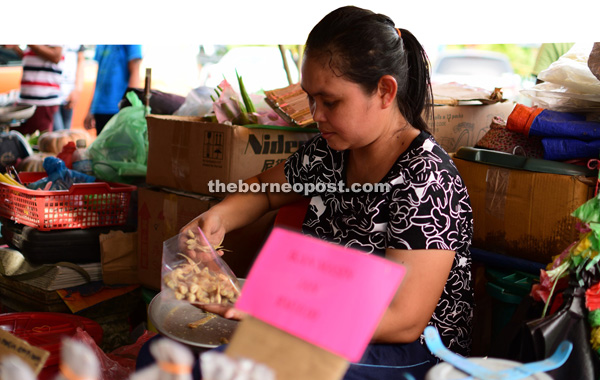
A trader weighs and packs the smoked fish for sale.
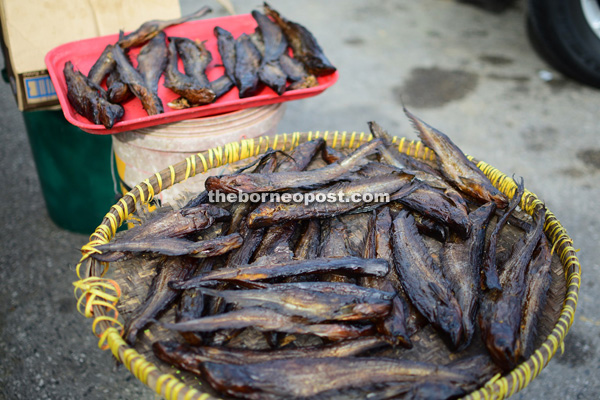
Some traders continue to dry the ‘ikan salai’ (smoked fish) before packing them.
SMOKING and salting are two food preservation methods widely used around the world.
Gone are the days when there were no refrigerators to store food for a prolonged time.
Here in Sarawak, fish are still made into ‘salai’ (smoked), ‘kasam’ (preserved), ‘ikan masin’ (salted) products not because there are no refrigerators to keep them, but because the enhanced flavours come with the preservation methods.
A trip to Lachau town, about 140km from Kuching, is definitely a must to sample the variety of preserved fishes on sale.
It’s a popular stopover with basic public amenities such as public toilets, a petrol kiosk and a playground.
Named after a small lizard found in the area, the town comprises about 40 shops — mostly sundry stores and coffee shops.
Petty traders line the five-foot ways, selling jungle produce such as ferns, fungi and vegetable shoots.
However those frequenting the town would have noticed that Pasar Harian Lachau (Lachau daily market) is the selling hub for a wide variety of fish — smoked and salted.
Among them are ‘salai keli’ (smoked catfish), ‘salai lajung’ (smoked lajung fish), ‘salai lemuk’ (smoked lemuk fish), ‘ikan masin pari’ (salted stingray), ‘ikan masin buntal’ (salted puffer fish), ‘kasam tapah’ (preserved tapah fish) and ‘rumpong’ (smoked prawns).
According to Lima Asan, smoked fish have been part of the Iban community’s diet for as long as she could remember.
“Some people love to eat their fish fresh; some prefer them smoked and salted,” she shared.
Lima, who has been trading at Lachau bazaar for more than 10 years, pointed out that most of the town’s sellers did not make their own preserved fish; rather, they would buy them (fish) from suppliers.
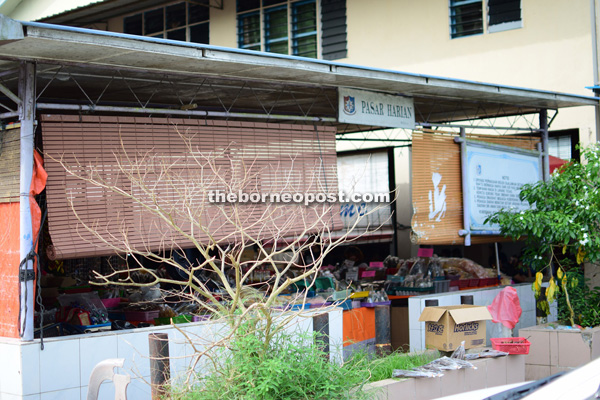
Pasar Harian Lachau is where a wide variety of preserved fish is sold.
The smoked and salted fish go through many different places before making it to Lachau market.
The 49-year-old mother of six said: “All of these are made in places like Spaoh, Sarikei, Kabong, Saratok and Sebuyau. Every now and then, the suppliers will come with smoked and salted fish. All we do is to weigh and pack them up.”
Besides preserved fish, most traders in the market also sell traditional Iban costumes, delivered from Lubok Antu, according to Lima.
Before Pasar Harian Lachau was set up, she used to sell vegetables at the five-foot ways of Lachau shophouses.
“I used to sell midin and other jungle produce — anything to get by,” she recalled.
Lima does her trading from six in the morning till six in the evening everyday — only taking an off-day when necessary.
As both tourists and locals love to stop at Lachau, business in the market is brisk.
Another trader, Magdalen Nanang from Rumah Lachau Engkabang Baru, said Sunday had always been Lachau’s peak day.
The Iban traders could not afford to lose one business day at Lachau town, conveniently located at the Kuching-Sri Aman Road.
The 45-year-old added: “When I need to take a day off, I ask my relatives to stand in.”
Like most traders in town, she acquires her products from the suppliers except for balur jelawat (fish).
“I have a supplier delivering fresh jelawat from Batang Ai to me. To make balur jelawat, I cure the fish in salted water for two days,” she shared.
Those not familiar with balur jelawat and kasam jelawat would assume they are similar as both are produced with jelawat fish soaked in salted water.
But they are different as fish seller Angela Usin explained: “Kasam jelawat is preserved together with rice and kepayang leaves while balur jelawat simply uses salted water.”
The 32-year-old picked ‘balur jelawat’ as her personal favourite among all of the preserved fish, saying: “It’s less salty and if freshly made, you can simply steam it before eating.”
She is considered a newcomer since she started trading at Lachau market just two years ago.
“I saw the business opportunity here, then decided to set up my stall,” she said.
Angela observed that perhaps it was the scrumptiousness and the variety of Lachau’s smoked, salted and preserved fish that made people coming back for more.
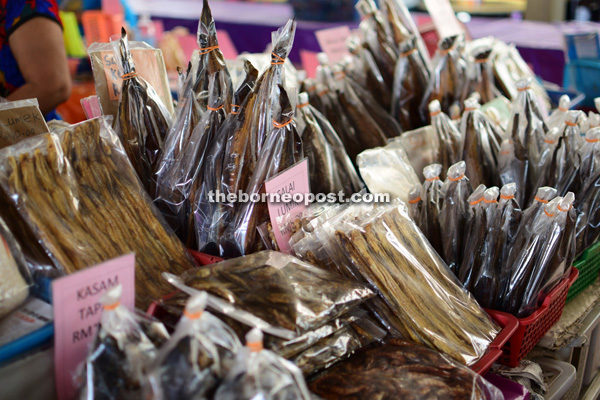
Packed smoked and salted fish at Lachau Market.
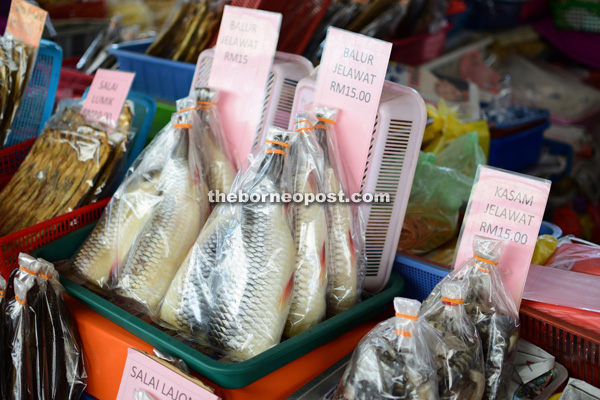
The ‘balur jelawat’ and ‘kasam jelawat’.
